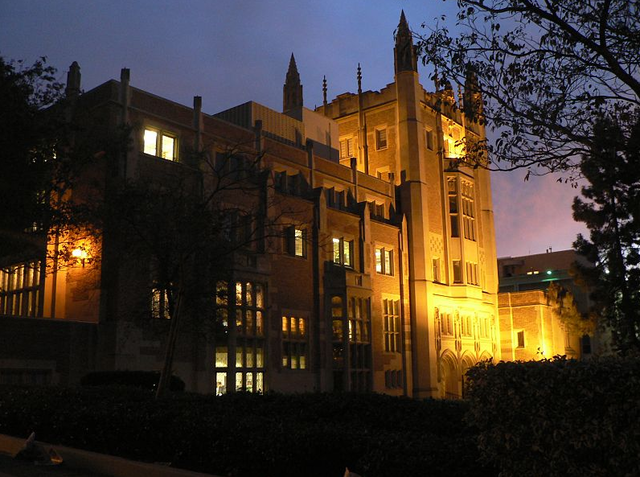Last week, the UCLA Undergraduate Student Association Council (USAC) elections resulted in a huge victory for the Bruins United “slate,” or campus political party, which secured nine of 14 spots on next year’s student council table. Bruins United has long benefited from Jewish students, who have served as a pivotal propeller of the party’s successes as both campaign workers and core constituents. The role those students played in this year’s sweeping victory was no different.
Traditionally, the alliance between students in the Jewish community and Bruins United has been driven largely by Jewish exclusion from other campus slates organized via identity-based coalition building, for which the Jewish minority status is apparently not sufficient for inclusion. The former Let’s Act slate, as well as this year’s Waves of Change coalition, are prime examples of this phenomenon. Of course, those slates do not claim to exclude Jews, as doing so would constitute a grievous violation of the “progressive” values they profess to champion. However, their vehement support of the movement to Boycott, Divest from and Sanction (BDS) Israel—which selectively discriminates against the Jewish state—as well as a string of anti-Semitic incidents and off-the-record comments from elected officials who run with those slates, speak much louder than their claims of inclusion.
In such an environment, Jewish students’ institutional support for a slate—not just individuals—that includes them and acts in their interests is entirely logical and justified. The problem arises when such a slate does not uniformly represent their interests, however, or when it does not align with Jewish values. In other words, the problem arises when the aforementioned ideal slate does not exist.
When the 2014-2015 USAC voted to call on the University of California to divest from Israeli companies allegedly profiting from the violation of Palestinian rights, it was not just council members who’d been elected via the Let’s Act slate who supported the resolution. Sadly, of those eight council members who voted for that resolution, two were candidates who had run with and benefited from all of the resources supplied by the Bruins United slate.
Those two council members, Fabienne Roth and Carlos Quintanilla, each were elected by extremely thin margins, with Quintanilla securing only 50.15 % of the vote to get elected and Roth securing the third and final spot for General Representative. To get elected, both relied heavily on Jewish support in their campaign staffs, which at the very least can be presumed to have provided the marginal boost that was necessary to achieve a minimum majority/plurality threshold. And yet, after hundreds of hours of hard work from members of the Jewish community, from which these council members directly and strongly benefited; and after so many Jewish students voted for those candidates; and after Jewish community members and Jewish students alike contributed financially to their campaigns, they took a stance against the interests of the Jewish community on the piece of legislation most important to the Jewish community.
Sadly, this negative outcome of Jewish support has not deterred further Jewish institutional support for the slate (again, not for individuals). In fact, this year, several Bruins United council members ran without publicly declaring a stance against the BDS movement. For instance, of the three general representative candidates running through Bruins United, only one, Zoe Borden, is on the public record in vocal opposition to the BDS movement.
And yet, some Jewish and some pro-Israel groups on campus opted to endorse the entire Bruins United slate of candidates. That is, despite a lack of verbal commitment to stand with the interests of the majority of Jewish students on campus, huge numbers of Jews and Jewish groups—on whom these candidates rely to get elected—willingly offered themselves not just to individual candidates who did pledge support for issues pertinent to the Jewish community, but rather to the entire slate.
At best, pledging unequivocal institutional support to an entire slate filled with candidates who do not uniformly take stances in alignment with the Jewish community is an unwise political move. As both a rich source of campaign support and a core constituency for these candidates, Jewish students are not sufficiently using their leverage to elect candidates who share their interests and will act in office accordingly. The current dynamic, in fact, represents a parasitic relationship, in which one party—the slate—benefits by taking resources from the other—Jewish students—without offering much in return.
At worst, continued institutional support for the Bruins United slate and the electoral system in which it operates represents a much deeper issue for the Jewish community: it contravenes and renders absent any sense of Jewish values in the electioneering process. Perhaps due to a false sense of importance, many of the campaign processes employed mimic processes used in real public elections, including tactics that are often extremely manipulative, insincere, or a combination of those two characteristics. These tactics do not represent Jewish values, and certainly do not merit widespread Jewish support, even only if through the channel of complicity.
It is not a Jewish value, for instance, to feign friendship in hopes of securing the votes of peers, as many candidates and their campaign staffs on all slates do. It is not a Jewish value, for example, to coercively manipulate students into voting, as many campaign staffs on all slates do. And it is not a Jewish value to support the pursuit of power by candidates without demanding an equal and opposite responsibility of those candidates to support the interests and needs of those students.
Bruins United has long been viewed as a channel through which Jewish Bruins can involve themselves in campus politics and have their interests represented at the council table. It is clear that nobody else will provide those resources to Jewish Bruins. But maybe Bruins United can’t, either. If such is the case, then it is time that Jewish students reevaluate how they engage in campus politics.

